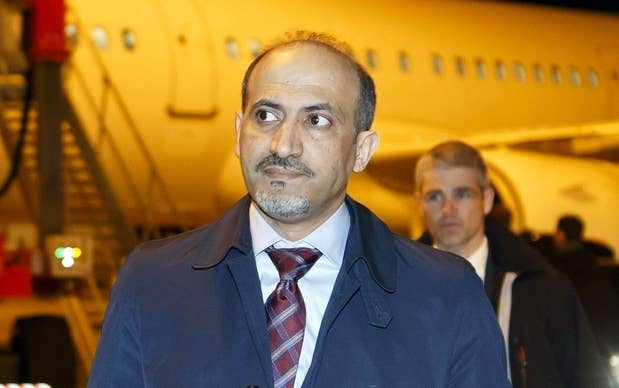
MONTREUX, Switzerland — Syria's main opposition-in-exile has never been fully sold on the peace talks that opened in Switzerland on Wednesday. It was still threatening to withdraw less than 48 hours before talks began, and its contentious deliberations over whether to attend included boycotts from members and a down-to-the-wire vote.
Many worried that the coalition — already derided as out-of-touch and ineffectual, or simply ignored, by many inside Syria — would lose what credibility it had left by entering into negotiations with the Syrian regime. The opposition's amateur politicians, some also feared, might also be out-classed.
But on the first day of the conference, at least, the opposition came out strong.
Wednesday was a day of speeches in long succession by the conference's main players, a prelude to the negotiations that begin at the United Nations in Geneva on Friday. Much of the attention focused on a face-off of sorts between the top names from each of the warring sides — Walid al-Moallem, Syria's foreign minister and the head of its delegation, and Ahmad al-Jarba, the former political prisoner who heads the opposition Syrian National Coalition.
Moallem surprised even his naysayers with a rambling and long-winded address delivered over increasingly desperate protestations from Ban Ki-moon, the U.N. secretary general acting as moderator. "We have come [to the talks] to prevent the collapse of the Middle East," Moallen said amid a litany of recriminations against the opposition, Syria's Gulf rivals and the West.
When Jarba took the microphone, he came across as the grown-up in the room — no small feat for the leader of a coalition whose members are known to slap one another during internal disputes.
As he delivered his remarks, some commentators on Twitter began to urge him on:
Come on Jarba…stick to your time #Geneva2
Others were quick to note the difference between the two politicians:
Geneva 2's first meeting: Moallem was emotional and nonsensical; Jarba is rational & offers clear-cut principles for a solution.
#Moallem derogatory remarks did a great service for opposition by showing 2whole world the mindset governing #Assad & his lackeys #Geneva2
Some also noted a surprising development: Jarba's remarks were being carried on Syrian state TV, even if they were being broadcast alongside footage described as "terrorist crimes."
Shocked to see the head of the #Syria opposition on Syrian state TV talking about #Assad crimes. Bizarre.
In his speech, Jarba embraced the protocol known as the Geneva communique, a roadmap for negotiations that holds that negotiations should end with a transitional government agreed upon by both sides. This was established in a previous peace conference in Geneva and is the goal of the current one, known as Geneva II. Then Jarba invited the Syrian delegation to partner with the opposition in pushing for that result, in effect taking the higher ground. Salman Shaikh, the director of the Brookings Doha center, called this "the most effective part of Jarba's speech. That's where he turned the tables. And it's an effective approach in that regard."
Sinan Hatahet, an opposition spokesman based in Istanbul, was quick to boast as the day drew to a close. "It seems that the regime wasn't prepared for the coalition to show up," he said. "And let's say that we played some hardball."
Hatatet said the fact that the opposition and regime were sitting down to negotiate undermined the narrative Syrian President Bashar al-Assad has pushed consistently since the conflict began.
"For the last three years the regime has been describing the opposition as terrorists who threaten the destruction of the state, and part of this narrative is that his state is not going to negotiate with terrorists," he said. "He wasn't going to give the opposition the moral standing of acknowledging that it exists. But sitting at the table with us is admitting it."
U.S. officials have also pushed the idea that attending the talks is a boost for the opposition — and while this is likely an effort to manage expectations, the opposition's inability to establish itself as a serious player has been an ongoing criticism.
"This is the chance for the opposition to show their skeptics — from the Russians to people in Syria — that they can be a viable alternative to Assad," a U.S. official told BuzzFeed. "This is their moment. The fact that the regime and opposition are sitting down across from each other is very significant."
The danger, critics say, is that the opposition walks away with little from the talks — or that they drag on so long that Jarba and his colleagues start to lose credibility with their base. As one source close to the opposition put it, "We are waiting to get something in return" for the participation in Geneva. Most immediately, this would likely mean badly needed aid reaching hard-hit areas under rebel control.
The talks have no end date ("I told my family I'm on an open-ended trip to Switzerland," one diplomat in Montreux said) — something that has worried some Assad opponents.
"Geneva II cannot be an open-ended process," warned an official with the Turkish government, which has been one of the opposition's most stalwart backers. "That's exactly what the regime wants — to buy time on the ground while it commits its aggression. We have to have an end game with a definitive time frame."
Shaikh, of the Brookings Doha Center, said the regime can also claim to have won legitimacy for its participation in the talks. And he added that the clock is already ticking for the opposition. Many of the armed groups that own the real influence in anti-Assad Syria are already deeply wary of Geneva II.
If the talks drag on and violence inside Syria continues, "these individuals will become even more skeptical," Shaikh said. "And therein lies the problem for the opposition: If they're not able to show some progress, and the situation on the ground gets worse, which it likely will, it's really going to get dicey."
